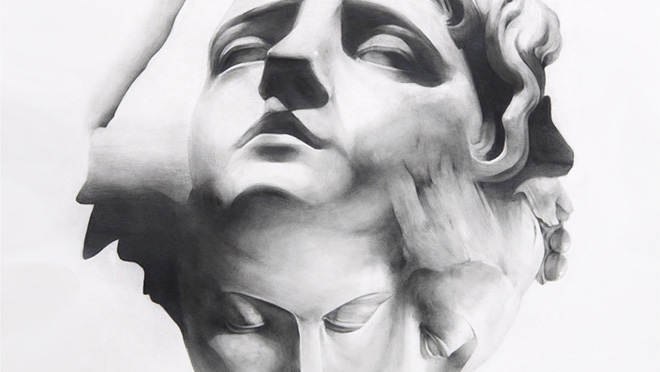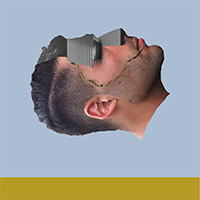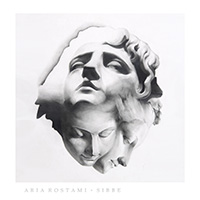We can't find the internet
Attempting to reconnect
Something went wrong!
Hang in there while we get back on track
Aria Rostami - Interview & Album Release
by
Achenar
Hello, tell us about yourself and what you do.
I’m both a musician and a producer so I have one foot in composition and performance and another foot in sound design. I’ve never been too interested in staying in a specific genre but I tend to lean in an experimental direction rather than a pop direction… both as a musician and as a producer.
Electronic music was something I fell into initially based on convenience in the sense that I didn’t need a band. Once I started recording at the age of 15 or 16 I didn’t want to wait on collaborators to help me finish songs. I didn’t have access to many instrument so I ended up using bad synth patches and editing drums using mostly samples I recorded in my room with a computer mic. By the time I left high school I think I had recorded nearly 300 songs. I still work very fast and I work constantly.
I don’t think I found any true grounding as an artist with something to say until I made the album “Form” at the age of 22. That album was about the illusion of control and both the production and compositions weave in and out from stable to unstable. It was the first group of songs I recorded after I got clean from drugs. It was the base of my simple understandings of adulthood and trying to break free from the cultural mindset and depictions of Millennials. That album was also the base of what the various themes of my music would be.
A year after I recorded “Form” my best friend and musical collaborator, Shawn Dickerson, disappeared. There’s a lot of unsolved specifics to the case but I have good reason to think he’s no longer alive. Shawn wasn’t the first death I had experienced but he has definitely been the most important person I’ve lost. He was an amazing talent and unfortunately only released one track… a remix of my song “Cleare” which was released on “Uniform” and if you have time you should give it a listen. My EP “Peter” was a dedication to my relationship with Shawn and more or less based on the world we lived in together.
There are a few releases after those ones but my creative work at this point centers around death, control, addiction, identity and I try to switch back and forth between a light-hearted playful aesthetic and a dark aesthetic as to hopefully give these topics many dimensions to live in.
Could you give us an insight into your latest release, Sibbe?
“Sibbe” (pronounced Sibby) focuses on information, the technology that proliferates that information and cultural identity. Both of my parents were born in Iran but my brother and I were born in the United States. I’ve only been to Iran once when I was 12… this was pre 9/11 so the Middle East wasn’t as large of a cultural topic as it is now. I was just old enough then to understand what Iran was and how it connected to me but not really mature enough to understand what identity is in a larger worldly sense. I especially wasn’t ready to become a “professional” on the Middle East, Islam, religious fanaticism, international relations and Iran post 9/11.
Granted, I definitely knew more about these topics than my peers did, which actually became part of a problem. It took quite some time for me to understand that my knowledge of Iran, Islam and the Middle East was informed by a very specific diaspora. My family, their friends and other Persians I knew all come from a specific slice of the greater Iranian culture. In other words, I only heard one story and I heard it frequently. I had always thought I knew the full picture. Even the news I’d hear from Iran came through major Iranian cities… for example the media tends to focus on Tehran. It’s not uncommon for people to ask me about Iran or the Middle East and my thoughts on specific things happening in the news because I am seen as an authority on the topic. In reality, I am removed from the true source and experience and in some ways even my sources are removed.
“Sibbe” is about that inaccuracy and also the wanting to understand. Some of the source material was sent to me from Iran by my dad and my girlfriend who were visiting at separate times and all the source material for the track “Sibbe III” was sent from Teipei by my friend Nicole who lives out there now. The source material was recorded secretly using cellphones. I wanted to use things like cellphones in this project because it is a way information is spread and collected whether that’s reading the news, talking to people in other countries, or NSA spying and data-mining (which is also why I appreciated the recordings were done in secret.)
I’ve also been listening to a lot of re-releases of older music from all around the world which have become more and more popular in the last decade. It’s always been easy for Western, English speaking countries to proliferate their media and influence to other countries but we’re finally at a time and place where the Internet and the greater interest in information has opened up the doors for this music to come back to us.
I look at “Sibbe” as an American album through and through although a lot of it is influenced by music outside of the United States. I also made a point to nonsensically mishmash cultural tones and ideas to show ignorance, appreciation and a push for something new.

To what extent do you make use of Renoise in your music creation process and what is the blend of hardware and software in your setup?
The only D/I I use is an Alesis Ion synthesizer and then everything else is either recorded through a microphone or sampled. When making experimental music, Renoise is my main instrument. Every track on this album and even going back to all the tracks on my first album “Form” were made using Renoise. I may write segments on instruments but I never plan a full song before I start recording because I’d rather filter it through the creative process of production while I’m writing.
I don’t know if this works for everyone but I’d definitely recommend not planning out an entire song before you record it if you’re the only person working on the song. The benefit of having collaborators is that there are many minds working at the same time. You can recreate that effect if you record and then write with what you’ve laid out. The problem with a big idea for a song from beginning to finish is that you’ll leave no room for flexibility or serendipity.
Do you involve live instruments in any way?
Yes. On the new album “Sibbe” for example I used piano, glockenspiel, violin, synthesizer, vocals, Turkish Tar and melodica. I’ll record passages on instruments and then if I don’t like the way it turns out I might cut them up and sample them to create something I would never have thought of just sitting in front of the piano, for example.
The track, Vietnamoses, caters to the dance floor, while the others are more ambient in nature. Was this planned in advance? Why not focus exclusively on one or the other?
I recorded many songs during this period, some of which had drum tracks. My EP “Czarat” was made during this time and the B-Side was “Vietnamoses.”I was originally only going to focus on the experimental non-percussive stuff for “Sibbe” but I thought “Vietnamoses” added something other songs couldn’t.
There may be a sense of elitism in experimental music that sees rhythmic music as lesser than. Or at least this may have been a driving point in the 20th century when people really wanted to challenge what we know about music and now it’s just part of the cultural understanding that songs with beats are in one box while ambient experimentalism is in another box. But truthfully, there is an overlap between the two. When done in a specific way, robotic rhythms and free-flowing sounds can each have a trance like hypnotic effect, which I think “Vietnamoses” captures. You can see this connection in cultures that chant or create drones when praying or meditating while other cultures will use drums and poly-rhythms in their religious practices.
This release just came out on the Audiobulb label. Do you have any upcoming shows or new releases planned?

I don’t really play my solo stuff live because I always create it with home listening in mind, but I am a part of a duo that performs live. I collaborate with Daniel Blomquist and we have two shows planned in San Francisco. We’ll be playing with Thomas Dimuzio and two other acts on Saturday, October 17th at Thee Parkside and we’ll be doing a collaboration set with a yet to be determined acoustic musician or group curated by Danny Clay on Saturday, December 12th at the Center for New Music. Daniel and I have enough songs recorded for an album, but we haven’t shopped anything out quite yet. Our songs are generally in the 10-15 minute range with long, slow builds and towering peaks.
I also have an LP called “Agnys” coming out digitally and on vinyl on Spring Theory sometime in January or February of 2016. “Agnys” is playful and joyful without being overstated or saccharine sweet and all in all pretty much the opposite in aesthetic when compared to “Sibbe”… all the songs have beats to them for example and they definitely give into a pop sensibility. “Agnys” was initially based around ideas Shawn and I never got to complete, but eventually grew into a bigger world of ideas as I developed it.
Who would you say have been your biggest musical influences and why?
Early on the two big ones were Nine Inch Nails and David Bowie. I was mostly into bad metal bands before the age of 14 and both of those guys showed me you could be dynamic with sound and style. I listen to a lot of music now but the artists that I am really inspired by would be people that are widely dynamic. To name a few I’d say John Zorn, Mike Patton, Trey Spruance, Moondog, Ryuichi Sakamoto, Yoko Kanno, Nobuo Uematsu, David Bowie, Aphex Twin, Daniel Lopatin, Bjork, Can, Demdike Stare, Dungen, Fennesz, Floating Points, Four Tet, Godspeed You! Black Emperor, The Haxan Cloak, William Basinski, Debussy, Chopin, Googoosh, Satie, Dave Brubeck, Bill Evans, Holly Herndon, Richie Cunning, Opiate, Pole, Andy Stott, Ata Ebtekar, Dariush Dolat-Shahi, Selda, Isao Tomita, Leyland Kirby, Dr. Lloyd Miller, Murcof, Pan Sonic, RAUM, Ryoji Ikeda, Secret Chiefs 3, Tim Hecker, Tortoise…
Are there any other things that you would say have an influence on your music?
I get bored very easily so my mind is always racing. I would never be able to pay attention in Elementary School because I was always day-dreaming. Even up until college I never found school to be that challenging… it was always hard for me to pay attention. There are some serious downsides to not really having to work in school… mainly you just don’t learn what it’s like to struggle to accomplish something but it taught me something about creativity I wouldn’t have learned otherwise.
When I would daydream I would think in ways that were productive. One thing I still do is I take some sort of visual stimulus or an object and I think about what it would be if it were a sound. So not exactly what sound it makes if you hit it but rather what tones, textures, notes, lengths, moods and so forth would this non-sound based stimulus have. I don’t mean that you then go ahead and make a concept album based on this or anything… I just did it to keep my mind thinking of sound in a different way.
One of my favorite musings was light trails on film from old footage of boxing matches in the 70/80’s and what that would sound like. I also like to look at plain uninspiring things like pencils and post-its and think about their sound because it’s a little more of a challenge.
How did you find out about Renoise and what attracted you to it in the first place?
Shawn had introduced me to it through a video Aaron Funk, aka Venetian Snares, posted on YouTube. I had no idea what a tracker was at the time. Renoise is much cheaper to buy than a lot of other equal quality DAWs, so I didn’t see the downside of spending the money for a product good enough for someone like Venetian Snares.
I didn’t touch the software for a while though. It wasn’t until I went to visit my parents for a week sometime in 2007/8 that I actually used it. The first night I was in town I met up with a good friend and she was at some turning point of her life and needed advice. I didn’t know what to say at the time. I went home and recorded an EP over the next 5 days using Renoise for the first time… I was forced to in a sense because I didn’t have any instruments to record with. I named the EP “Advice” and I gave it to her at the end of the week. It was just some sweet gesture… I didn’t know what else to do. Regardless, I’ve used Renoise ever since.
Finally, is there any particular new feature you’d like to see in a future version of Renoise?
The ability to automate instrument modulations and Autoseek tracks with pitch modulation. It’d also be nice if the pitch envelope could span more than 6.144 seconds like it did in previous versions.
(Editor’s Note: Technically, you can get longer envelopes. Set the envelope to beat synced mode, extend it to the maximum 24 beats, set your song tempo to the lowest 32 BPM, then switch the envelope back to milliseconds. It will now be around 45 seconds in duration, and you can switch the song tempo back to normal.)

